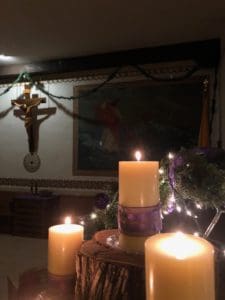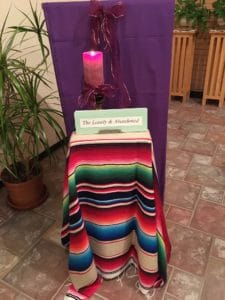This Third Sunday of Advent, we rejoice with great expectation in the Lord’s coming to each of us now and forever. We share a Franciscan Gospel reflection and questions written by Fr. Paul Gallagher, OFM. They are edited by Franciscan Sister of Christian Charity Sister Anne Marie Lom and Joe Thiel. The excerpts from the Sunday readings are prepared by Joe Thiel. To read or download the complete pdf with excerpts for your prayer, please click here: Franciscan Gospel Reflection December 16 2018. Excerpts from the Lectionary for Mass for Use in the Dioceses of the United States of America, second typical edition © 2001, 1998, 1997, 1986, 1970 Confraternity of Christian Doctrine, Inc., Washington, DC. Used with permission. All rights reserved. No portion of this text may be reproduced by any means without permission in writing from the copyright owner. Please include this information when printing.
Photo: St. Peter Mission, Bapchule, Arizona; Immaculate Conception Convent, Yuma, Arizona
Luke 3:10-18
And the crowds asked John the Baptist, “What then should we do?” He said to them in reply, “Whoever has two cloaks should share with the person who has none. And whoever has food should do likewise.” Even tax collectors came to be baptized and they said to him, “Teacher, what should we do?” He answered them, “Stop collecting more than what is prescribed.” Soldiers also asked him, “And what is it that we should do?” He told them, “Do not practice extortion, do not falsely accuse anyone, and be satisfied with your wages.”
Now the people were filled with expectation, and all were asking in their hearts whether John might be the Messiah. John answered them all, saying, “I am baptizing you with water, but one mightier than I is coming. I am not worthy to loosen the thongs of his sandals. He will baptize you with the Holy Spirit and fire. His winnowing fan is in his hand to clear his threshing floor and to gather the wheat into his barn, but the chaff he will burn with unquenchable fire.” Exhorting them in many other ways, he preached good news to the people.
Background
John is associated with preparing for a messiah, and the expectation at the time was that a messiah would come to bring a political transformation. John, too, looks for a Messiah who will come with the Holy Spirit and fire. He would bring judgment, and usher in a new age that would be free from Roman rule. But as Luke records John’s message, he keeps John’s message that the Messiah would lead Israel to throw off Roman rule and become a great nation very subtle. Perhaps this is because he does not want the Roman authorities to look at the early Christians as a threat to their authority.
Three times the question is asked of John, “What should we do?” John is calling everyone to repentance, a repentance that is demonstrated by a change in how one lives daily life. John does not suggest that people join his austere life in the desert; but that they live with concern for others, honestly, and with integrity. Each time John is asked “what we should do,” his response indicates that they should live out their given role in society faithful to their responsibilities, considerate of others, and not taking advantage of their position.
Verse 12 begins with “even tax collectors…” Luke is making sure his audience is aware that even tax collectors and soldiers were responding to John’s call to conversion. The fact that John was instructing them as to how they should behave also suggests that their conversion had awakened in them a sincere effort to live differently. The tax collectors in verse 12 could be likened to toll collectors. Often, they could not find other types of work, and they were forced to collect tolls as people were crossing roads or bridges, or entering ports or city gates. The soldiers mentioned in verse 14 were guards who were assigned to protect the tax collectors. Both the tax collectors and the soldiers would be Jews who were despised by others because they were looked upon as aiding an occupying Roman government.
Reflection Questions
1. Luke states in verse 15 that the people were filled with expectation. When you think of being filled with expectation…
2. When you think of people who need to be invited to live with a sense of expectation…
3. If you were to ask John what is it that you should do to prepare for the coming of the Messiah, you suspect he might say something like…
4. Of all the people who were coming to John for baptism, why would Luke single out soldiers and tax collectors?
5. John seems to know himself and who he is not. He also asks people to live within the limits of their life. Can you talk to God about you desire to live authentically your own station in life, or some struggle you may be having to live beyond yourself, or some other awareness that arose within you from this gospel?




